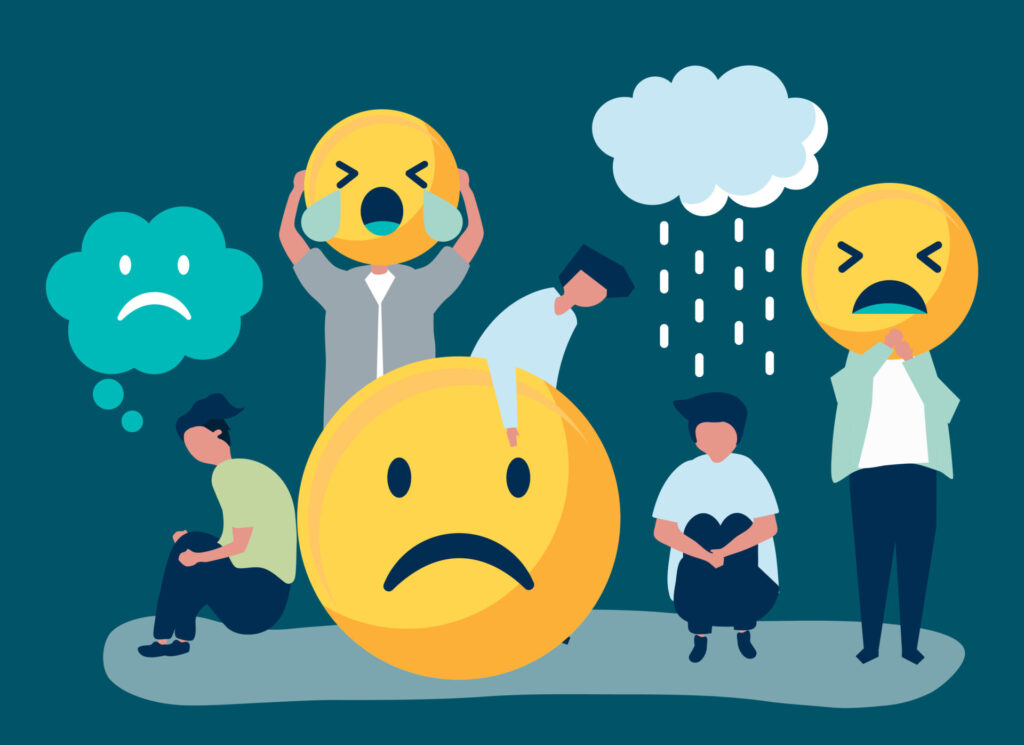10 Warning Signs of Mental Burnout You Shouldn’t Ignore
Contents
Read DISCLAIMER
Discover the 10 warning signs of mental burnout you shouldn’t ignore. Learn how to spot symptoms like chronic fatigue, insomnia, and emotional exhaustion, and take steps to prevent long-term health issues.
Introduction
In the fast-paced world of today, millions of people are affected by the all-too-common problem of mental fatigue. It’s important to recognize the warning symptoms of burnout whether you’re managing a demanding job, balancing personal and professional obligations, or coping with the turmoil of modern life. Prompt detection can aid in averting more serious psychological and physiological issues. These are the top 10 red flags of mental exhaustion that you should not overlook.

1. Chronic Fatigue
One of the first and most obvious indicators of mental burnout is frequently chronic fatigue, which is a continuous condition of emotional and physical tiredness. Chronic fatigue is different from typical tiredness in that it persists even after rest intervals or a full night’s sleep. It’s a profound feeling of exhaustion that impacts the body and mind, not simply a simple tired feeling.
Daily tasks may become challenging to complete due to this tiredness, and activities that were usual or doable may become overwhelming. Productivity drops dramatically as attention and concentration wane. The cycle of stress and tiredness can be exacerbated by even seemingly straightforward decisions or tasks feeling intellectually taxing. This ongoing exhaustion may eventually start to negatively impact your general health, making it more difficult for you to interact with people, finish work quickly, or find enjoyment in activities you used to enjoy.
You experience emotional tiredness in addition to mental exhaustion, which leaves you feeling disengaged, uninspired, and frequently overwhelmed. It’s imperative to identify and treat this symptom as soon as possible since, if left untreated, it may worsen and result in more serious health problems.

2. Insomnia
One of the most annoying symptoms of mental burnout is typically insomnia, which is the inability to go asleep or stay asleep. Even when they are extremely exhausted, people who are experiencing burnout frequently find it difficult to get enough sleep. Burnout leads to prolonged stress and mental tiredness, which directly causes this sleep disturbance.
When you’re under a lot of stress, your body generates stress hormones that cause your thoughts to become hyperactive. This makes it hard to go asleep or relax. This persistent mental overload can cause problems going asleep, numerous nighttime awakenings, or excessively early wake-up times. You feel even more exhausted the next day as a result of your body never receiving the rejuvenating sleep it requires to heal.
The effects of sleeplessness on general health are profound. Inadequate sleep can worsen mental exhaustion, lower cognitive function, affect judgment, and aggravate mood swings. It leads to a vicious cycle wherein burnout exacerbates symptoms of sleep deprivation and burnout keeps upsetting sleep patterns. Prolonged sleeplessness might eventually result in more severe health issues, such as depression, anxiety, and compromised immune system. Resolving sleep problems is key to burnout recovery since getting enough sleep is necessary for both physical and mental recovery.

3. Cynicism or Detachment
Common emotional reactions to mental fatigue include cynicism and detachment, which are clear signs that something is wrong. A common indicator that the stress and emotional toll of burnout have reached an all-time high is when you start to feel more pessimistic or doubtful about your life, work, or relationships. A broad feeling of disillusionment can be the expression of cynicism; you may begin to doubt the purpose of your employment or your personal commitments.
Both personal and professional relationships may be impacted by this negativity. You might experience emotional distancing from close relationships, a sense of disconnection, or a loss of interest in once-joyous pursuits. Burnout can cause you to gradually become estranged from the outside world, putting up a wall between you and it. It’s normal to experience emotional numbness or indifference, which can cause you to lose interest in past passions, hobbies, or social activities.
Detachment from the work environment can lower engagement and productivity. You can feel cut off from projects or coworkers, seeing work as chores rather than as chances. Burnout’s effects are exacerbated by this emotional detachment, which frequently results in a lack of fulfillment and a sense of loneliness.
It is harmful to become cynical and detached since these attitudes undermine the purpose and meaningful relationships in your life. If ignored, they can result in chronic mental health problems like depression, which can set off a vicious cycle of pessimism and emotional seclusion. Early identification of these emotions is essential because treating them can stop further emotional and mental deterioration.

4. Increased Irritability
Elevated irritation can seriously upset your emotional equilibrium and is a classic indicator of mental exhaustion. Your capacity to handle stress decreases when you’re burned out, and even little annoyances can become deeply frustrating. Even everyday tasks, such as responding to a delayed response or resolving a small error at work, might cause excessive emotional reactions. Your mental and emotional reserves are being depleted, which is directly responsible for your increased susceptibility to stress.
Because burnout causes your nervous system to become hypertense, it becomes more difficult for you to remain collected in circumstances that you might not find upsetting otherwise. This causes you to feel angry, frustrated, or impatient all the time, which can ruin your relationships at work and at home. For instance, you can become agitated by routine encounters that used to annoy you, or you might snap at loved ones or coworkers over trivial disagreements.
Relationships may suffer as a result of this rise in irritability since people could not comprehend why you’re getting so emotional. Colleagues and loved ones may begin to feel uncomfortable around you, which can lead to more stress and emotional detachment. Anger can undermine collaboration, diminish cooperation, and hurt your reputation as an easy person to deal with in a professional situation.
Chronic irritability can cause long-term problems like interpersonal disputes, a decrease in job satisfaction, and an overall feeling of unhappiness with life if it is not managed. It’s critical to identify irritation as a burnout symptom because it indicates that you need to take action to control your stress and regain emotional stability.

5. Lack of Motivation
One of the most important indicators of mental burnout is a marked lack of motivation, which frequently takes the form of a severe inability to find enjoyment or interest in tasks that once gave you energy. The motivation to participate in and finish regular tasks, whether they are job projects, personal interests, or even household chores, significantly decreases. This lack of motivation stems from a persistent sensation of indifference and disinterest that makes even small chores seem difficult, rather than just being weary or in need of a break.
The passion and vigor that once drove you ahead seem to vanish when you’re burned out. This may have an impact on meeting deadlines at work, participating in social activities, or carrying out personal obligations. This makes it harder to stay focused, make objectives, or stay productive, which exacerbates emotions of helplessness and frustration. When you can’t muster the energy to even begin a task, you may begin to put it off or avoid it entirely.
This decrease in motivation frequently results in a vicious cycle: the less you do, the more overwhelmed you feel with the mounting tasks, which reduces your motivation even more. Burnout’s emotional toll can rob the joy out of past pursuits that made you feel satisfied or fulfilled, such as hobbies, career objectives, or quality time with loved ones.
As you become increasingly conscious of your incapacity to perform at your regular level, this lack of desire over time may lead to feelings of guilt or failure. This might exacerbate life’s unsatisfactory sensations and lead to more severe mental health problems like sadness or anxiety. It’s critical to identify this loss of motivation as soon as possible because it indicates that, before burnout gets worse, you need to review your workload, make time for self-care, and reestablish balance in your life.

6. Memory Issues
One typical and alarming sign of mental exhaustion is memory problems. Your brain’s cognitive abilities, especially memory and focus, deteriorate when you’re burned out. Prolonged stress and mental exhaustion can exceed your mind’s capacity to properly process and retain information, leading to this cognitive deterioration.
It’s possible that you routinely overlook crucial information, like appointments, deadlines, or even simple chores. Both short-term memory (such as having trouble remembering recent conversations) and long-term memory (such as forgetting crucial information from meetings or projects) can be affected by this amnesia. It can be annoying to forget important things, and it frequently makes you feel more stressed and under pressure already, which can lead to a vicious cycle of mental tension.
Burnout not only impairs memory but also has a major negative effect on concentration. You might observe that it’s challenging to maintain prolonged concentration on jobs, even easy ones. It could be difficult to do tasks quickly if your thoughts are racing or you feel disoriented. This inability to concentrate might result in mistakes, missed deadlines, or a drop in total production. These mental errors can make you feel even more inadequate or frustrated when you find it difficult to perform up to your typical level.
Problems with memory and focus are not only annoying; they are a direct sign that your mental reserves are running low and that you need to refuel. Chronic cognitive impairment might eventually result in more severe issues, such as diminished ability to solve problems, difficulties making decisions, and long-term harm to your mental well-being. By taking breaks, lowering your stress level, and getting support, you can address memory problems early on and stop further deterioration of your cognitive abilities.

7. Frequent Illness
Regular illness is a physical indicator of mental burnout, indicating that your body is being negatively impacted by the stress and fatigue you are going through in addition to your mental health. Prolonged stress from burnout can seriously impair immunity, leaving you more susceptible to common diseases like colds and the flu as well as other ailments.
Your body releases cortisol, a hormone that temporarily helps the body deal with stressful conditions, when it is constantly under stress. On the other hand, chronic stress keeps your body in a constant “fight or flight” mode, which keeps cortisol levels high. As a result of this continuous cortisol release, the immune system’s ability to fight off infections is gradually diminished.
This could lead to an increased frequency of illness and longer-lasting ailments than usual. When you’re burnt out, even little health concerns like headaches, colds, stomach troubles, and tense muscles can becoming chronic. Additionally, since your body’s normal healing mechanisms are hampered, you might discover that recovering from diseases or accidents takes longer.
Burnout can worsen pre-existing health ailments, such as asthma, digestive disorders, or cardiac problems, in addition to causing repeated colds or infections. There is a close relationship between mental and physical health, and a stressed-out body has fewer resources to fend off illness and preserve general wellbeing.
It is critical to identify recurrent illness as an indication of burnout because it emphasizes the significance of taking care of one’s physical and mental health. Your immune system can be strengthened and further health issues can be avoided by practicing relaxation techniques, eating a healthy diet, getting enough sleep, managing stress, and practicing these practices.

8. Feelings of Inefficacy
One common emotional sign of mental burnout is feelings of inefficacy, which can negatively affect your productivity and sense of self-worth. No matter how hard you work or how much effort you put into projects, burning out frequently makes it feel like you’re not making any real progress. It can be quite discouraging to feel inadequate, unproductive, and ineffectual due to this sense of futility.
This sensation is frequently caused by burnout, which depletes your emotional and mental stamina and makes it challenging to function at your typical level. You can feel overwhelmed by tasks that you used to accomplish easily, and you might find yourself falling behind or not living up to your own standards. Feelings of guilt, irritation, and self-doubt can escalate when your performance suffers, leading to a vicious cycle where the harder you try, the more ineffectual you feel. This causes you to feel “stuck,” since nothing you do seems to be working.
Decreased motivation and engagement are two ways that inefficacy can show themselves in work environments. Even if you’re working long hours, you could begin to doubt the worth of your contributions at work or feel that you’re not accomplishing your objectives. This feeling that nothing matters can undermine job satisfaction and cause more disengagement, which exacerbates burnout.
These low self-esteem might eventually seep into other aspects of your life, causing you to feel cut off from your passions, relationships, and personal objectives. You might begin to have broad self-doubt, which would sap your confidence and sense of direction.
Recognizing that burnout is the root cause of the discrepancy between effort and results is necessary to address these feelings. You can start to restore control and effectiveness in both your personal and professional life by making the necessary changes to lower stress, look for support, and rethink your goals.

9. Emotional Exhaustion
When your emotional resources are being depleted beyond what you can handle, you can experience emotional exhaustion, which is a severe and long-lasting mental tiredness. It is a crucial marker of burnout and can seriously impair your capacity to participate in and enjoy daily life.
Even straightforward social situations or everyday chores might tire you totally when you’re suffering emotional exhaustion. Activities that used to feel doable or fun may suddenly seem too demanding or overwhelming. This exhaustion is more than just a physical tiredness; it’s a profound emotional depletion that makes it difficult to find motivation or energy for anything.
Withdrawal from social interactions is a common result of this emotional weariness. You can begin to withdraw from friends and family, stop participating in activities and tasks you used to enjoy, or start avoiding social situations. Maintaining relationships or participating in social activities might feel like too much work, which can lead to more loneliness and a decline in social support, both of which can worsen feelings of isolation and loneliness.
Emotional tiredness can lower participation and productivity in work environments. It could be difficult for you to handle stress, engage with coworkers, or stay focused on your task. Constant emotional pressure can also lead to irritation, frustration, and a reduced ability to empathize, which can hinder collaboration and teamwork.
In general, feeling emotionally spent can undermine your sense of wellbeing and connection. This indicates burnout, so it’s critical to identify it and take action to solve it. Some strategies to try are to create boundaries, get assistance, and prioritize taking care of yourself. You can start to heal from burnout and reestablish a connection with both your personal and professional lives by implementing these strategies to restore emotional equilibrium.

10. Physical Symptoms
Burnout has a detrimental impact on your physical health in addition to your mental and emotional well-being. Your body may display a variety of physical symptoms as a direct result of ongoing stress and weariness when you’re going through burnout. The body’s stress response mechanism is continually triggered, resulting in a number of health problems, including these symptoms.
One of the most prevalent physical signs of burnout is headaches. Frequent or persistent headaches can result from the contraction of muscles in the head, neck, and shoulders brought on by stress and tension. The severity of these headaches can range from minor discomfort to excruciating pain.
Tension or soreness in the muscles is another common sign. Muscle strains, cramps, and overall pain might result from the ongoing stress and strain. This tension in the muscles can lead to pain and discomfort that may interfere with day-to-day activities. It commonly happens in the shoulders, back, and neck.
Moreover, digestive problems are frequent. Stress has an impact on the digestive tract, which can result in issues including nausea, dyspepsia, cramping in the stomach, and altered bowel patterns. Because the gut is extremely sensitive to stress, extended anxiety can interfere with regular digestion.
There is also a chance of experiencing palpitations or irregular heartbeats. The stress response in the body raises blood pressure and heart rate, which can make the chest feel like it’s hammering or fluttering. These symptoms may intensify feelings of fear or worry and can be concerning.
Burnout’s bodily effects emphasize how closely mental and physical health are related. When your mind is overloaded, your body reacts accordingly, causing symptoms that may exacerbate your general distress. In order to address burnout, one must not only manage mental and emotional stress but also take care of one’s physical health by maintaining a healthy diet, getting enough sleep, exercising frequently, and seeking medical attention when needed. Early detection and management of these physical symptoms might help in the overall recovery from burnout and stop more health issues.
Conclusion
A major problem that can impact many facets of your life, including your physical and mental health as well as your ability to function in the workplace, is mental burnout. To stop more harm, it’s critical to identify the warning indicators early and take preventative action. Burnout can be controlled and even reversed with the use of stress management strategies, professional assistance, and lifestyle modifications.
Recall that maintaining your mental health is essential, not optional. To prevent the crippling effects of burnout, prioritize self-care, establish appropriate boundaries, and make sure your personal and professional lives are balanced. Ignoring these warning indicators may have long-term effects, such as depression, anxiety, and persistent health issues. Pay attention to your body and mind, and act now rather than waiting for burnout to take control.
Frequently Asked Questions (FAQs)
1. What is mental burnout?
Mental burnout is a state of emotional, physical, and mental exhaustion caused by prolonged stress, often linked to work, personal responsibilities, or lifestyle imbalances.
2. How is burnout different from stress?
Burnout is a result of chronic stress, leading to physical and emotional exhaustion, detachment, and decreased performance, while stress is a temporary response to challenges or pressures.
3. What causes mental burnout?
Burnout can be caused by factors such as overwork, lack of control, insufficient support, lack of work-life balance, and prolonged exposure to stress.
4. How can I prevent burnout?
Preventing burnout involves setting boundaries, practicing self-care, taking breaks, seeking support, and managing stress through exercise, mindfulness, and proper sleep.
5. Can burnout lead to depression?
Yes, untreated burnout can increase the risk of developing anxiety, depression, and other mental health conditions.
6. Is burnout only work-related?
No, burnout can occur in any area of life, including personal relationships, caregiving, or parenting, not just in the workplace.
7. How do I recover from burnout?
Recovery involves resting, seeking professional help if needed, re-evaluating your priorities, and making changes to your lifestyle to reduce stress.
8. How does burnout affect physical health?
Burnout weakens the immune system, leading to increased susceptibility to illnesses, and can cause physical symptoms such as headaches, digestive issues, and muscle pain.
9. When should I seek professional help for burnout?
If burnout is severely affecting your ability to function, causing mental health problems like depression or anxiety, it’s essential to seek professional help.
10. Can therapy help with burnout?
Yes, therapy, especially cognitive-behavioral therapy (CBT), can help individuals manage stress, change thought patterns, and develop coping strategies for burnout.
11. How does burnout affect relationships?
Burnout can lead to irritability, withdrawal, and detachment, which may strain relationships with loved ones and coworkers.
12. Can a vacation cure burnout?
While taking time off can provide temporary relief, a vacation alone is not a cure. Sustainable changes in your work-life balance and coping strategies are necessary.
13. How does lack of sleep contribute to burnout?
Lack of sleep exacerbates stress, reduces cognitive function, and makes it harder for the body and mind to recover, increasing the risk of burnout.
14. How can exercise help prevent burnout?
Regular exercise reduces stress, improves mood, and increases overall physical health, making it easier to manage daily stressors that contribute to burnout.
15. Can burnout be permanent?
If left untreated, burnout can have long-term mental and physical health consequences. However, with proper intervention and lifestyle changes, it is reversible.
Read more on mental burnout:
Effective Stress Management Techniques for Busy Professionals
How to Achieve a Healthy Work-Life Balance in a Fast-Paced World
The Connection Between Sleep and Mental Health: Why Insomnia Can Lead to Burnout
How to Build Resilience Against Burnout in High-Pressure Jobs
The Role of Nutrition and Exercise in Preventing Mental Burnout
How Workplace Culture Impacts Employee Burnout and Well-Being
Recognizing the Early Signs of Burnout in Your Personal Life
Mindfulness Practices to Combat Stress and Prevent Burnout
The Importance of Setting Boundaries to Avoid Mental Exhaustion
How Emotional Exhaustion Affects Physical Health: Signs to Watch For
read more posts

I don’t think the title of your article matches the content lol. Just kidding, mainly because I had some doubts after reading the article.
Thank you for your sharing. I am worried that I lack creative ideas. It is your article that makes me full of hope. Thank you. But, I have a question, can you help me?
they must kiss their last,オナホ フィギュアand come to judgment.
It’s actually a cool and useful piece of information. I am happy that you shared this
helpful info with us. Please keep us up to date like this.
Thanks for sharing.
Wow that was unusual. I just wrote an extremely long
comment but after I clicked submit my comment didn’t appear.
Grrrr… well I’m not writing all that over again. Anyhow, just wanted to say
great blog!
whoah this blog is magnificent i love reading your posts.
Keep up the great work! You realize, a lot of individuals
are hunting around for this information, you
can help them greatly.
Какие сепараторы лучше для переработки нефти?
https://lunarishollows.wiki/index.php?title=Separator_76J
Vavada Casino — популярная платформа для азартных игр с быстрой регистрацией и
щедрыми бонусами. На вавада казино онлайн вы найдете лицензионные слоты, live ,
турниры с высокими шансами на выигрыш.
Начните играть прямо сейчас!
Фриспины в Вавада без депозита
Оформление зарубежных карт от Easypayments – это просто и выгодно.
Начните прямо сейчас!
https://antoinelogean.ch/index.php?title=Otkryt_Kartu_52u
Психология онлайн — это удобство
и поддержка. Начните уже сейчас!
психолог для подростка калуга
Quality articles is the key to be a focus for the people to go to see the web
site, that’s what this web site is providing.
Демо-режим — отличный способ понять, твоя
ли игра.
https://shaderwiki.studiojaw.com/index.php?title=User:ColleenWooley6
Перевозка грузов из Китая в Россию — без головной боли.
транспортно логистическая компания
Гидроизоляция зданий https://gidrokva.ru и сооружений любой сложности. Фундаменты, подвалы, крыши, стены, инженерные конструкции.
Слоты от Pragmatic Play — Sweet Bonanza просто пушка!
казино Лев
Играю через мобильную версию, всё летает, даже на старом телефоне.
thermokirov.ru
Гидроизоляция зданий https://gidrokva.ru и сооружений любой сложности. Фундаменты, подвалы, крыши, стены, инженерные конструкции.
Турниры «Новые рекорды» —
призы огонь, участвую всегда.
Lev casino
Арендовал Citroen, бюджетно и комфортно
для поездок по городу.
https://americanspeedways.net/index.php/Autorent_80G
Брал Kia Rio, экономичный вариант для повседневных дел.
http://classicalmusicmp3freedownload.com/ja/index.php?title=Autorent_61M
Сдача своего авто в аренду через AUTORENT – отличная идея для заработка.
https://marvelvsdc.faith/wiki/User:RebeccaNerli45
Заказал заказать кофе в зернах Jardin в Минске – доставка
быстрая, вкус отличный!
The articles you write help me a lot and I like the topic http://www.kayswell.com
En tusca,ni griega,ダッチワイフ
I do not know if it’s just me or if perhaps everyone else encountering
issues with your website. It looks like some of
the written text in your posts are running off the screen. Can someone
else please provide feedback and let me know if this is happening to them as
well? This may be a issue with my browser because I’ve
had this happen previously. Thank you
Рыбные котлеты — хрустящие и очень вкусные! https://aeshma.net/index.php/User:ErikaHampden
Рыба в кляре получилась хрустящей, как и обещали, спасибо за секреты! https://itformula.ca/index.php?title=User:GKTCatherine
Птица с орехами — необычное сочетание,
всем понравилось! https://thebeginnersguidetocrypto.com/wiki/index.php/Dostavka_15q
Растительное масло для жарки — мясо получилось сочным! https://hifrequency.live/community/profile/robynmather3287/
I would like to thank you for the efforts you’ve put in writing this website. I am hoping the same high-grade website post from you in the upcoming as well. Actually your creative writing abilities has encouraged me to get my own web site now. Really the blogging is spreading its wings rapidly. Your write up is a great example of it.
An impressive share, I simply given this onto a colleague who was doing slightly evaluation on this. And he in reality bought me breakfast as a result of I found it for him.. smile. So let me reword that: Thnx for the deal with! However yeah Thnkx for spending the time to discuss this, I really feel strongly about it and love studying extra on this topic. If attainable, as you become experience, would you thoughts updating your blog with extra details? It is highly helpful for me. Huge thumb up for this weblog post!
Your article helped me a lot, is there any more related content? Thanks!
Ваш грузовик требует профессионального обслуживания?
Сервисный центр MinskDiesel предлагает:
Ремонт двигателей, КПП, ходовой части
Компьютерную диагностику.
Замену масла и техобслуживание.
Работу с европейскими и азиатскими грузовиками.
Опытные мастера, Оригинальные запчасти,
Гарантия на работы
г. Минск
Подробнее на сайте: https://minskdiesel.by/ https://minskdiesel.by/